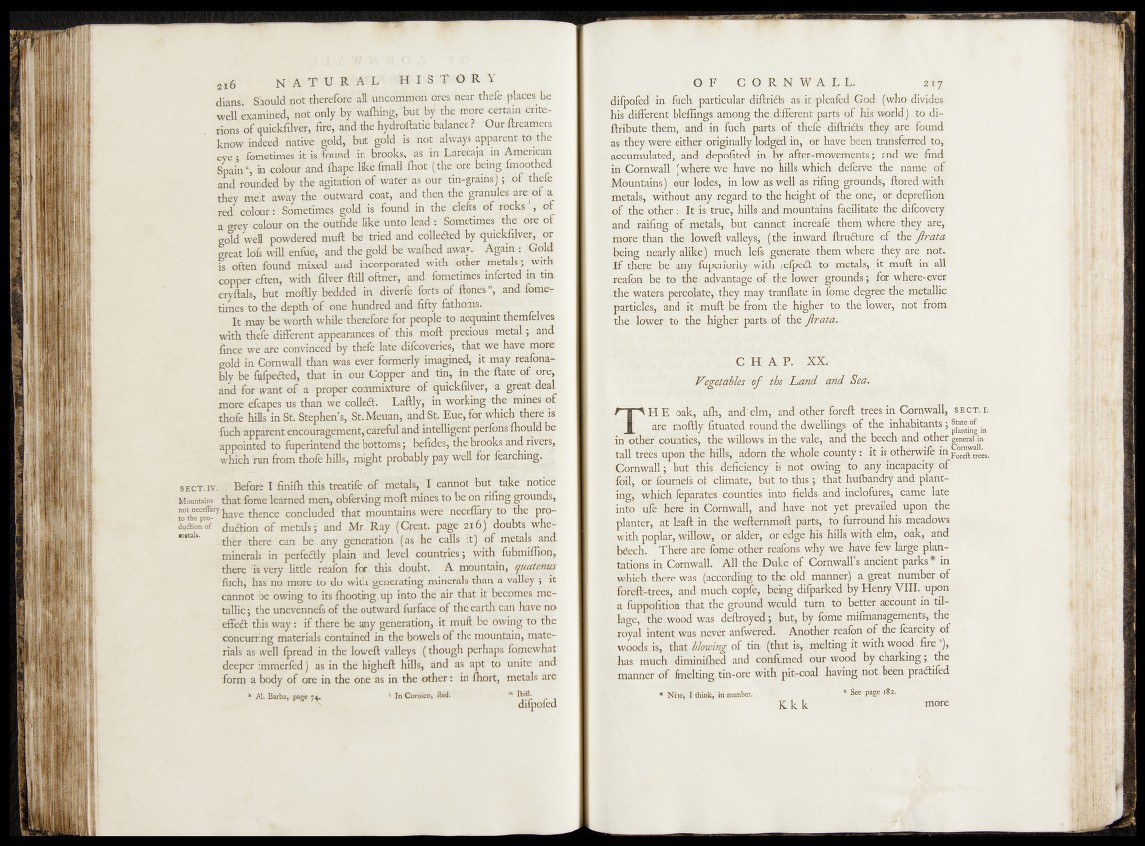
2 I6 N 'A t b r a l h i s t o r Y
diafls Should not therefore all uncoirinron dies dear thefe places be
well examined, not only the more c€rt*jn
rions of quickfilver, fire, and the hydtoftatic balance ? Our ftreamers
know indeed native gold, but gold is hot .always apparent to the
eye’ fometimes it i§ Found in brooks, as in Larecaja- iu American
Spain'5, in colour and fhape likêfmall {hot (the-ore beingSmoothed
and rounded by, the agitation of water as our tin-grains) 5 o f thefe
they melt away the outward coat, and then thé grahules are o f a
red colour: Sometimes gold is found in the clefts of rocks , of
a grey colour on the outfide like unto lead : Sometimes the ore o f
gold well powdered muft be tried and cdlleöed by quickfilver, or
great lofs will enfue, and the gold be waihed away. Again : Gold
is often found mixed and incorporated with other metals.; with
copper often, with filver ftill oftner, and fometimes inferted m tin
cryMs, but moftly bedded in diverfe fom o f 0bnësm, and fometimes
to the depth of one hundred and fifty fathoms. / '
It may be worth while therefore for p e o p le t o acquaint themfelves
with thefe different appearances o f this moft precious metal; and
fince we arc convinced by thefe late difeoveries, that we have more
gold in Cornwall than was ever formerly imagined, it may reafomti
bly be fufpefted, that in our Copper and tin, in the Rate of orej
and for want of a proper commixture qfquickfilyer, a great deal
more escapes us than we colleét. Laftly, in working the mines of
thofe hills in St. Stephen’s, St.Meuan, and St. Eue, for which th?re is
fiich apparent encouragement, careful and intelligent perfons fhould be
appointed to foperintend the bottoms; . bolides, the bfooks and fibers,
which run from thofe hills, might probably pay well (for foarching. .
s e c t . iv. • Before I finifh this treatife ofmetals? T catinot but take noticip
Mountains that feme learned men, obferving moft mines to be on rifing grounds,
to^thepS7 have thence concluded that fountains, were neceffary to the mo-
duflion of dudion of metals; and Mr. Ray (Croat, page 216). doubts whe-
‘n,fc>ls' ther there can be any generation (as he calls it) of metals and
minerals in perfectly plain and level countries; with fubmiffion,
there is very Httie reafon for this doubt. A mountain, qpiatenus
luch, has no more to do with ^generating, minerals than a valley ; it
cannot be owing to its fhooting,up into the air that it becomes metallic;
the unevennefs o f the outward furface of the earth can have no
efieffc this way: if there he any generation, it muft be owing to the
concurring materials contained in the bowels of the mountain, materials
as well Ipread in the loweft valleys ^ though perhaps fomewbat
deeper immerfed) as in the higheft hills, and as apt to unite and
form a body of ore in the one as in the other: in fhort, metals are
k Al. Barba, page 74. " Ibid,
difpofed
In Coroico, ibid.
o l wr 1 C O I N W A L M'j, § ' Wk
difpofed in foch particular diftrkfs astittipleafed God (who divides
•his different bleftings.among the,different.parts pf his world;) to di-
ftribute them, arid in foch, parts o£ thefe diftricts they, are found
as they were either originally, lodged inf or h%ye been transferred to,-
accumulated, and ffepofited jn'iby after-movements; and we find
in Cornwall (wherqwe have no hills which deferve the name' of
Mountains) our lodes, in low, as well n&'-ftftng grounds, ftprfedwith
itietals, without, any regard, to the height ‘of .thefo|feX or ;depreffic$r
pf the-other, :;,It is .true,- hills! ajidt mountains facilitate the difeovery
and raffing of na'etals, but cannot', increafe them 'ftpsm they art,
rnore than the,,loweft valley'^f( the' inward '-ftru^tufe
being,nearly alike fr much lejs\genetate’ st^em whjsfft they-str'e^tipj^
I f t}jei;eUbe any, fuperiority' witi|£refpe<ff, to. metals, it muft in all
reafon be to the advantage^p%the^©|5er; gi-ouhtiS j-^fdr wli£re-ever
,the waters percolatq, tjpey may t^anflate' in.ff me degree the metallic
particles,, and tit muft be from^e; higher .tpvJth©,l;0we%fhpt'ffrom
the lower to the higher parts' of the Jlrata.
„ C H A P . XX,
Vegetables ~tf : the Lewd, afid Sea.
Tj l H E oak, afh, and'elm,1 and other foreft .trees'^ Cornwall, s e c t . h
are moftly fituated round the dwellings of the inhabitants; St^eof ^
in other counties, the willows in the vale, and the beech and other grandjy
tall trees upon the hills, adorn the whole count yi t is otherwife in Foreft trees.
f&ornw^I ; _but this deficiency'^^it W in g to any incapacity of
foil, or fournefs of climate, ‘ffoWo tiiis^p that hufoandry aM p la c ing,
which feparates counties into fields s and inclofures, Game late
into' ufe here in Cornwall, and have not yet prevailed upon the
planter, at leaft in the wefternmoft parts, to furround his meadows
with poplar, willow, or alder, dr .edge his hills with elm, oak, arift
beech. There are fome othtef reafons why, we Have few'large plan-
tations in Cornwall. All the Duke of Cornwall’s ancient parks* in
which there was (according to the'old manner) ‘a.great .number of
foreft-trees, and much copfe, being difparked by Henry VIII. upon
a fujipofition that the grourfdi; yvould turn to better ^account in tillage,
the, wood was d e f t r o y e i | ; b y fome mifmanagements, the
royal intent was never anfwerea. Another reafon of the fcarcity of
woods.is, that blowing of tin (that is, .melting it.with wood,fire ”),
has much diminifhed and cohfumed our wood by charting; the
manner of fmelting tin-ore with pit-coal having not been pradifed
* Nine, I think, hi number,
K k k
a See page 182*
more